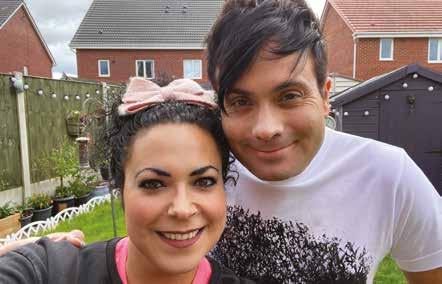
2 minute read
ASK THE SUICIDE QUESTION
Ben is 38. He knows what it’s like to feel suicidal. He also knows that by talking and getting help it can get better. Here’s his story…
“I’d struggled with my mental health since my twenties, but I thought it was just my quirky ways so I didn’t speak about it. I didn’t know I was entering a crisis. My family did. They tried to help but they didn’t know how to.
I thought a lot about death and how to end my life. I didn’t want to die, I just wanted to make sense of what was going on in my head – and I wanted it to end.
My partner Nevean says I looked vacant back then. My parents say I was just a shell. I became psychotic. I thought people could read my mind, that I was getting signals from the TV to take my life. I started to self harm.
It wasn’t till I went to my GP five years ago that I lifted the lid on 20 years of silence. I went into a mental health unit and then into the early intervention service, where I started working with my psychologist Diane Griffiths. She rolled up her sleeves and got to the root of the problem. She was amazing; she helped me tackle my thoughts and feelings. For two years after that I was still self harming, but by then it was a way of developing a tolerance to unpleasant feelings as I worked on being myself.
Looking back, when I thought about suicide it was to get some relief that there might be an end to the mental anguish. It was like being in a tunnel with no light at the end. I didn’t want to hurt my family and my partner but I felt they’d be better off without me.
I’d been with Nevean for 11 years. It must have been so difficult for her and my parents. The more I opened up to professionals the more I could see little chunks of hope.
I still have bad times, but where before it would knock me back for years, I’m able talk openly without fear of repercussion. I’ve realised I don’t have to skirt round the issue to those closest to me.
If you think someone is suicidal ask, in a matter of fact way. It won’t make them any more likely to do it, but they’ll be glad you’ve asked and started the conversation I waited so long to have.
Ben Harris is a learning facilitator at Bootle Life Rooms. Watch Ben's story at the Zero Suicide Alliance YouTube channel.
As COVID-19 cases rise and the pandemic continues to increase demand for mental health services across the country, the Zero Suicide Alliance (ZSA) calls for determined action.
ZSA’s new Step Up module is designed to give people the skills required to identify and reach out to someone whose mental health may be suffering.
Founder member of the Alliance, Joe Rafferty, explains: “The pandemic has placed a great strain on mental health services. The Royal College of Psychiatrists has said that its members are seeing an alarming rise in patients needing urgent and emergency care and they forecast the arrival of what they call a ‘tsunami’ of mental illness.
“More than 1.3 million people have already accessed our original ZSA suicide awareness training and we hope that many more will now benefit and be better equipped to help save a life with the addition of our COVID-19 specific Step Up training package.”
www.zerosuicidealliance.com

